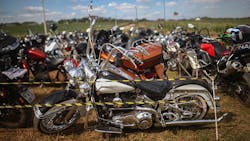President Donald Trump continued to court his pro-manufacturing base with yet another summit involving a chief executive officer, greeting Harley-Davidson Inc. executives and union officials at the White House on Thursday.
The event was a meeting and listening session, White House spokesman Sean Spicer said in a press briefing, calling the motorcycle maker an “American success story since 1901.”
“We want to make it easier for business to create more jobs and more factories to be made in the U.S. and you’re a great example of that,” Trump told the executives.
Trump is seeking to uphold campaign promises to return lost manufacturing jobs to the U.S. The president has met with the CEOs of the traditional domestic automakers as well as the heads of Dow Chemical Co., Whirlpool Corp., Lockheed Martin Corp. and U.S. Steel Corp. all in his first two weeks in office, indicating he’ll take a hands-on role in U.S. corporate decision-making, especially if it’ll lead to job creation for middle-class Americans. Mary Barra, General Motors Co.’s CEO, will return to the White House on Friday for her second meeting in as many weeks.
Joining Trump for the Harley meeting were executives including CEO Matthew Levatich and union officials representing workers at the Milwaukee-based company. Harley’s home state of Wisconsin, which surprised some pollsters when it awarded its 10 electoral votes to Trump, has traditionally supported Democratic candidates with pro-union policies.
Wisconsin Base
Trump canceled a scheduled visit to Wisconsin on Thursday to deliver a speech on the economy and manufacturing out of concern that the event would attract protesters, CNN reported Tuesday. The company’s powertrain facility in Menomonee Falls, Wisconsin, was being considered for a presidential visit but nothing had officially been scheduled, Maripat Blankenheim, a Harley-Davidson spokeswoman, said Thursday.
Harley-Davidson said in October it planned to temporarily lay off about 225 salaries employees to cut costs amid weak motorcycle sales, the Milwaukee Journal Sentinel reported at the time.
Trump isn’t the first politician to try to wrap himself in the motorcycle brand. Wisconsin Governor Scott Walker, during his failed presidential bid in 2015, used his own Harley-Davidson motorcycle and connections to the company as a symbol of American freedom, independence and to sell a regular guy image.
Like Walker, White House Chief of Staff Reince Priebus is from Wisconsin and familiar with the company and its record of working with unions to gain efficiency.
Helping Harley
Harley’s success has been helped by government assistance, something often labeled “corporate welfare” by members of the Republican Party.
Since 2000, the motorcycle manufacturer has benefited from $54.5 million in local and state subsidies and more than $2 billion in federal liquidity support, according to Good Jobs First, a group in Washington that monitors business incentives.
The vast majority of the subsidies have come from Missouri, where in 1998 the company opened a factory after asking several states for economic development incentives offers. Missouri awarded Harley roughly $44 million, the Good Jobs First data show. Much of it came in the form of a reduction in Harley’s state income tax liability, in exchange for meeting hiring and other goals. The data show $2.3 million in assistance from Wisconsin, all before Walker took office.
At the peak of the financial crisis in late 2008 and early 2009, the Federal Reserve also helped Harley at least indirectly by backstopping the commercial paper market. Former Fed Chairman Ben Bernanke, in a 2011 letter to members of Congress, highlighted the manufacturer as a success story, saying that one of the Fed’s programs to fight the financial crisis“provided support to businesses as diverse as Harley-Davidson and National Rural Utilities, when the usual market mechanism for their day-to-day funding completely dried up.”
In the past, company officials have stressed that federal assistance didn’t involve a direct loan and that Harley-Davidson’s involvement in the program was for less than four months.
About the Author
Bloomberg
Licensed content from Bloomberg, copyright 2016.
